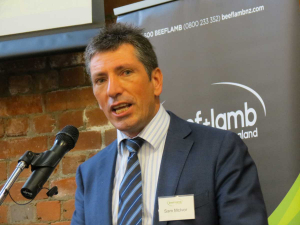Cleland named OSPRI chair
Southland farmer and director Tony Cleland has been named OSPRI New Zealand’s new chair.
 NZ Meat Board chief executive Sam McIvor told its recent annual meeting that the organisation's balance sheet remains strong.
NZ Meat Board chief executive Sam McIvor told its recent annual meeting that the organisation's balance sheet remains strong.
After 100 years in existence, the New Zealand Meat Board (NZMB) now oversees $2.3 billion of red meat exports yearly to the markets in the European Union, UK and USA.
Chairman Andrew Morrison told the recently-held annual meeting that its effective quota management role continues to underpin the sector's success.
"NZMB now manages two new quotas following the withdrawal of the UK from the EU, UK Sheepmeat and Goatmeat, and UK High Quality Beef," he explained.
Morrison, who hosted the online meeting on March 15 alongside chief executive Sam McIvor, said NZMB's duties will now expand with it taking on responsibility for the administration of transitional Free Trade Agreement quotas between the UK and New Zealand.
"The UK and EU proceeded with their plan to split the quota between the two markets. Negotiations around quota splits are ongoing," he explained. "However, we anticipate that a nominally greater share than originally proposed will be allocated to the EU to reflect the market access outcomes of the New Zealand-UK FTA." Morrison added that it was critically important that quota administration is kept in New Zealand to maintain the quality of our quota and give certainty to companies in export planning.
He says NZMB is also responsible for $82.2m of farmer reserves - with $61m in a contingency fund including $2.7m for quota market contingencies and the remaining $21m in general reserves.
"This provides crucial funding to assist in a crisis to re-open export markets... and deliver funding for industry-good activities such as genetics," Morrison says.
McIvor spoke about the board's performance in the face of disruption caused by Covid.
"We pivoted quickly to work remotely and benefited from an intensive programme of staff support, resourcing and resilience tools."
He says the organisation also carried out a review of its operating costs to ensure the fees are sufficient to meet the delivery requirements and a statutory audit of NZMB's quota management by the Ministry for Primary Industries and it complied with the Meat Board Act.
A surplus of $5.8m from reserves and quota management and $6.1m surplus from reserves management was reported at the AGM. Quota management activities recorded a deficit of $331,000, with quota management reserves drawn down as the NZMB worked through Brexit issues. McIvor says the board's balance sheet remains strong with net assets of $82.2 million.
Meanwhile, the meeting recommended investing up to $1 million a year on the Informing New Zealand Beef (INZB) genetics programme, which aims to increase the uptake and use of genetics in the beef industry.
This would see the NZMB joining MPI and Beef + Lamb New Zealand (B+LNZ) in supporting the seven-year Sustainable Food & Fibre Futures (SFFF) partnership, which aims to boost meat sector profits by $460m over the next 25 years.
The NZMB says it is currently working through feedback from farmers on the proposal.
The meeting also agreed to lift the annual pool for director fees from $144,200 to $147,500.
Fonterra’s impending exit from the Australian dairy industry is a major event but the story doesn’t change too much for farmers.
Expect greater collaboration between Massey University’s school of Agriculture and Environment and Ireland’s leading agriculture university, the University College of Dublin (UCD), in the future.
A partnership between Torere Macadamias Ltd and the Riddet Institute aims to unlock value from macadamia nuts while growing the next generation of Māori agribusiness researchers.
A new partnership between Dairy Women’s Network (DWN) and NZAgbiz aims to make evidence-based calf rearing practices accessible to all farm teams.
Despite some trying circumstances recently, the cherry season looks set to emerge on top of things.
Changed logos on shirts otherwise it will be business as usual when Fonterra’s consumer and related businesses are expected to change hands next month.

OPINION: Here w go: the election date is set for November 7 and the politicians are out of the gate…
OPINION: ECan data was released a few days ago showing Canterbury farmers have made “giant strides on environmental performance”.